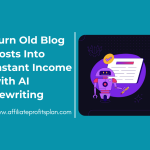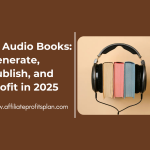Welcome to my article “The Rise of Podcasts in Digital Marketing: How to Get Started” Podcasts have come a long way from their humble beginnings as a niche medium for tech geeks and storytellers. Today, they are a digital marketing powerhouse, with millions of listeners tuning in daily to get everything from true crime stories to the latest business insights. In fact, if you’re not incorporating podcasts into your digital marketing strategy, you might be missing out on a goldmine of opportunities. But don’t worry, you’re not alone—many brands are just now waking up to the potential of this audio medium.
The podcasting world is booming, and it’s not just for the big names or famous personalities. In 2025, an estimated 100 million people in the U.S. alone will listen to podcasts monthly. That’s a lot of ears on the other end of those headphones! So, whether you’re running a startup or managing a global brand, podcasts can help you connect with your audience in a way that written content or social media posts just can’t. Picture this: your listeners tuning in on their morning commute or while doing chores, hanging on to every word of your brand’s story—sounds pretty powerful, right?
But don’t worry if you’re not ready to launch your own podcast just yet. In this article, we’re breaking down everything you need to know about starting a podcast for your business and using it to elevate your digital marketing strategy. Grab your mic and hit record—your podcasting journey is about to begin!
Access Our Proven Tested Formula for $50-$100 Daily Income – Watch This FREE Video >>

The Growing Popularity of Podcasts in Digital Marketing
If you haven’t noticed the rise of podcasts, you might be living under a rock—or, well, a very quiet rock. Podcasts have officially become a cultural and marketing phenomenon, taking over commutes, gym sessions, and even office hours. It’s not just another fad, either. The numbers speak for themselves: over 50% of U.S. consumers have listened to a podcast, and nearly 40% of those listeners are tuning in on a weekly basis. That’s a massive audience, and brands are catching on to the fact that this isn’t just a cool trend—it’s a valuable tool for reaching new customers, building relationships, and driving sales.
So, why the podcast explosion? Well, it’s all about the intimacy of the medium. Unlike blogs or social media, podcasts allow brands to connect with listeners in a way that feels personal and authentic. Think about it—when you listen to a podcast, it’s just you and the host. You can hear their tone, their enthusiasm, and even their chuckles, creating a genuine connection. That’s a powerful thing for any marketer looking to build trust and rapport with their audience. And, because podcasts are typically consumed passively (during commutes, workouts, or while multitasking), they create a rare opportunity to engage with listeners in moments when they’re more likely to focus.
And here’s the kicker: podcasts are highly shareable, too. A podcast episode can easily be shared via social media or word of mouth, allowing your message to spread organically. Plus, people often stick with podcasts they like, which means if you’re able to produce valuable and engaging content, you could end up with a loyal following that grows over time. As a result, podcasts are becoming a cornerstone of a well-rounded digital marketing strategy—offering brands a chance to connect with their audience in a way that’s fresh, fun, and ultimately, highly effective.
The Benefits of Podcasting for Digital Marketers
So, you’re thinking about jumping on the podcasting bandwagon. Smart move. Podcasting isn’t just the latest “shiny object” in digital marketing; it’s a powerhouse tool with a ton of benefits that can elevate your brand’s presence in ways you may not have expected. Let’s dive into some of the key perks that make podcasting so irresistible to digital marketers.
First up, podcasts are a goldmine for building brand awareness. Imagine you’re driving to work, and suddenly, you hear a familiar voice talking about a topic you’re interested in—only, this time, it’s tied to a brand you’ve never heard of before. That voice belongs to your favorite podcast host, who just so happens to be talking about your brand, product, or service. That’s the power of podcasting: it creates an opportunity to get in front of an audience that’s already engaged and listening. With podcasts, you’re not just shouting into the void like a social media ad. You’re delivering your message to a captive audience that’s actively tuning in to hear what you have to say.
But wait, there’s more! Podcasting is also an amazing tool for establishing authority in your industry. By creating episodes around topics that matter to your target audience, you not only get to showcase your expertise but also position your brand as a thought leader. And because podcasts are often long-form content (we’re talking anywhere from 15 minutes to an hour or more), you have the chance to dive deep into subjects, providing listeners with more value than a quick tweet or blog post ever could. The result? You’ll be building trust with your audience, making them more likely to come to you when they need solutions.
And here’s a biggie: podcasts are incredibly cost-effective compared to other forms of content marketing, like video or paid advertising. Starting a podcast can be relatively low-cost, especially if you already have the tools and expertise to record. In fact, the ROI for podcasts can be higher than many traditional marketing methods, considering that once you create an episode, it lives on and can be repurposed over and over again. You can share it on your website, social media, and in email campaigns, extending its lifespan far beyond the initial launch.
Last but certainly not least, podcasts are super shareable. With the power of social media, a single episode can reach far beyond your initial listener base. Subscribers often share episodes with friends, family, and colleagues, creating organic growth that’s much harder to achieve through paid ads or other marketing tactics. It’s the viral, word-of-mouth marketing that many marketers dream of!
So, if you’re looking to boost your brand’s credibility, reach a loyal audience, and do it all while keeping your costs low, podcasting could be your secret weapon in the world of digital marketing. It’s a no-brainer for any brand looking to stay ahead of the curve.
How to Start a Podcast for Your Business or Brand
Alright, so you’re convinced that podcasting is the way to go for your business. You’ve heard the success stories, you’re ready to jump in, and maybe you’ve even daydreamed about hearing your own voice echoing through the ears of thousands. But now the question arises: how exactly do you get started? Don’t worry, we’ve got you covered! Here’s your step-by-step guide to launching a podcast that’ll make waves for your brand.
Step 1: Define Your Podcast’s Purpose and Audience
Before you even think about equipment or software, it’s time to get strategic. You want to ask yourself some essential questions: Why are you starting this podcast? What do you want your audience to take away from it? What problem are you solving with your content?
Your answers will help define your podcast’s mission, tone, and direction. For example, if you’re a fitness brand, you could create a podcast that offers health tips, interviews with industry experts, or even motivational content. Knowing your purpose will keep your content on track and ensure you’re meeting your audience’s needs. And speaking of the audience—this is crucial. Understand who your listeners are and tailor your content to their preferences. Are they young professionals, parents, or fitness enthusiasts? Get specific here!
Step 2: Choose the Right Format and Structure
Now that you know your why and your who, it’s time to think about the how. What format will your podcast take? Will you have solo episodes where you share your insights, or will you invite guests for interviews? Maybe a hybrid approach is best, with a combination of solo and guest-led discussions.
Deciding on your format early on will help guide the structure of your episodes. You’ll also need to think about frequency—are you doing weekly episodes, bi-weekly, or monthly? Consistency is key, so make sure your schedule is manageable and realistic for you and your team. After all, podcasting is a long-term game!
Step 3: Gather Your Equipment (It’s Not as Scary as You Think)
Here’s where a lot of people get intimidated, but let’s ease your nerves: you don’t need to go out and buy a high-end soundboard and a microphone that costs more than your rent. To start, all you really need is a decent microphone, headphones, and recording software.
For microphones, there are some affordable options that will provide crystal-clear sound quality without breaking the bank (think USB mics like the Blue Yeti). As for recording, there are a ton of free or low-cost options, like Audacity or GarageBand, that will get the job done. Once you’ve got your gear, practice makes perfect. Get comfortable with the equipment and your recording environment to minimize distractions (and background noise).
Step 4: Record and Edit Your Episodes
This is where the fun happens! Start by scripting or outlining your episodes. You don’t need a word-for-word script, but having a general structure will keep you focused. Make sure to talk to your audience like you’re having a conversation. The beauty of podcasts is the informal tone you can adopt, so let your personality shine through!
Once you’ve recorded an episode, it’s time for editing. You’ll want to cut out any awkward pauses, “ums,” or errors to keep the flow natural and engaging. There are plenty of free and paid editing tools that make this process easy. Don’t be afraid to get a little creative with your editing, adding in intro and outro music or sound effects to give your podcast a professional touch.
Step 5: Publish and Promote Like a Pro
Alright, now you’ve got an episode (or a few) ready to go! The next step is to choose a hosting platform to distribute your podcast. Popular options include Buzzsprout, Podbean, and Anchor. These platforms will push your podcast to all the major directories, like Apple Podcasts, Spotify, and Google Podcasts, so your content is accessible to as many listeners as possible.
But it doesn’t end there. Promoting your podcast is just as important as creating it. Share it across your social media platforms, embed it on your website, and send out email blasts to your followers. You can even cross-promote with other podcasters or invite influencers to be guests on your show to expand your reach. The key to success is consistency in content creation and promotion. Keep engaging with your audience, responding to their feedback, and adjusting your strategy to keep things fresh.
Bonus Tip: Have Fun with It!
Podcasting is a fantastic way to showcase your brand’s personality and connect with your audience on a deeper level. Don’t overthink it. If you’re having fun, your listeners will, too. And as your podcast grows, you’ll see the benefits for your business—not just in brand visibility, but in customer loyalty, trust, and even revenue.
So, there you have it—your road map to launching a podcast for your business. Ready to get started? The world’s waiting for your voice!
Promoting Your Podcast for Maximum Reach
So, you’ve got your podcast up and running, and it’s sounding better than ever. But here’s the hard truth: if you’re not promoting it, no one’s going to hear it. That’s right—creating amazing content is only half the battle. The real magic happens when you get it in front of the right audience. So, how do you promote your podcast for maximum reach? Let’s dive into some tried-and-true strategies that’ll help you grow your listener base and make your podcast the next big thing in digital marketing.
1. Leverage Your Existing Platforms
First things first: promote your podcast where you already have an audience. That’s right—your social media accounts, email lists, website, and blog are all prime real estate for podcast promotion. Use them! If you’ve built a following, they’re already interested in what you have to offer, so give them an easy way to find your podcast. Share links to your episodes, post teaser clips or behind-the-scenes content, and make sure your podcast is prominently featured on your website. You’ve already done the hard work of building a loyal following—now it’s time to get them to listen!
2. Get Social (Media, That Is)
Social media is arguably the most powerful tool in your podcast promotion arsenal. The trick is to know how to use it effectively. Each platform has its own vibe and audience, so you’ll need to tailor your strategy to fit each one. On Instagram, you can share audiograms (those fun audio snippets with captions) and photos of your recording setup. Twitter is perfect for live-tweeting during episodes or sharing thought-provoking quotes from your guests. TikTok? Oh, it’s a goldmine for creative, attention-grabbing clips. Think of your social media channels as the stage for your podcast’s best moments.
But here’s the key: don’t just push new episodes—engage with your audience. Respond to comments, create polls, ask questions, and build a community around your podcast. When people feel connected to your content, they’re more likely to share it, helping you expand your reach even further.
3. Collaborate with Other Podcasters and Influencers
No one’s an island—especially in the podcasting world! Collaborating with other podcasters or influencers in your niche can help you tap into a whole new audience. Whether you’re guest-starring on someone else’s show, co-hosting an episode, or cross-promoting with other podcasters, this type of collaboration is a win-win. You get exposure to their audience, and they get access to yours.
Access Our Proven Tested Formula for $50-$100 Daily Income – Watch This FREE Video >>
Plus, you can invite guests with a strong following to be on your show. When your guest shares the episode with their followers, you’re gaining exposure from a highly engaged and interested audience. It’s like a free ticket to reach new ears!
4. Utilize SEO for Podcasts
If you think SEO is only for blog posts and websites, think again. Optimizing your podcast for search engines can help new listeners find your content. Start by optimizing your episode titles and descriptions with relevant keywords. Think about what your target audience is searching for when they’re looking for podcasts in your niche. Are they searching for “entrepreneurship tips,” “digital marketing strategies,” or “self-improvement podcasts”? Use these phrases in your episode titles, descriptions, and show notes to improve discoverability.
Also, consider transcribing your episodes and posting them on your website as blog posts. This gives you even more content to rank on Google, increasing your chances of getting discovered by people searching for the topics you cover.
5. Encourage Listener Reviews and Ratings
Did you know that podcast directories like Apple Podcasts and Spotify use listener reviews and ratings to determine podcast rankings? That means the more positive reviews and ratings your podcast gets, the higher it’ll appear in search results, and the more likely new listeners will stumble upon it. So, encourage your audience to leave reviews at the end of each episode. You can even offer incentives, like shout-outs or bonus content, for those who take the time to leave a review. The best part? Listener reviews are a powerful form of social proof that can attract more people to check out your podcast.
6. Run Ads (If Your Budget Allows)
If you’ve got a marketing budget and want to supercharge your podcast’s growth, consider running paid ads. Platforms like Facebook, Instagram, and Google Ads can be great ways to target potential listeners who are interested in the topics you cover. You can create teaser ads that give a taste of your podcast’s content or run ads promoting specific episodes. Make sure to target your ads to your ideal listener demographic so you’re not wasting money on people who wouldn’t be interested in your content.
7. Create an Email Newsletter for Your Podcast
If you’re not already sending out a regular email newsletter, now’s the time to start! Newsletters are a great way to build a loyal fan base and keep your audience engaged with your podcast. You can send out weekly or bi-weekly updates that include links to your latest episodes, behind-the-scenes insights, and exclusive content. Make sure to encourage your subscribers to share the newsletter with friends or colleagues who might be interested in your podcast. After all, word-of-mouth is one of the most powerful promotional tools out there!
8. Use Podcast Directories to Your Advantage
Finally, make sure your podcast is listed on all the major podcast directories. While Apple Podcasts and Spotify are the big players, don’t overlook others like Google Podcasts, Stitcher, TuneIn, and Podbean. Each directory gives you access to a new pool of potential listeners, so the more places your podcast is available, the better your chances of being discovered.
Remember to keep your listings up-to-date and include links to your podcast on your website and social media profiles. If listeners can’t find your podcast easily, they won’t stick around.
Wrap It Up: The Long-Term Strategy
Promoting your podcast isn’t a one-time thing—it’s a long-term effort that requires consistency and creativity. Keep experimenting with new promotional tactics, analyze your results, and adjust your strategy accordingly. The more you invest in growing your audience, the greater your reward will be in terms of engagement, brand awareness, and business growth.
So go ahead, get the word out, and let the podcasting magic begin! Your listeners are waiting, and with the right promotional strategies, your podcast will be their next favorite show.
Monetizing Your Podcast for Revenue
So, you’ve put in the hard work—hours of recording, editing, and promoting. Your podcast is gaining traction, and listeners are hanging on to every word. But here’s the big question: how do you turn those loyal listeners into cold, hard cash? Don’t worry; we’ve got you covered. Monetizing your podcast isn’t as complicated as it sounds. With the right strategies, you can start raking in revenue while doing what you love—sharing your voice with the world. Let’s dive into the various ways you can start making money from your podcast!
1. Sponsorships and Ads
The most popular way to monetize a podcast is through sponsorships and ads. Brands love podcasts because they offer a direct line to a highly engaged audience, and advertisers are often willing to pay top dollar to get their products in front of your listeners. But how does this work?
Well, once your podcast starts gaining traction and you’ve built a steady audience, you can reach out to companies or work with podcast ad networks to secure sponsorship deals. The ads can either be host-read (where you mention the sponsor during the episode) or inserted ads (pre-recorded messages that play at the beginning, middle, or end of the episode). Both options can generate revenue, but host-read ads tend to be more lucrative because listeners trust the hosts and appreciate the personal touch.
You don’t need to have a massive following to start with ads either. Many companies look for podcasts with highly targeted audiences, so even a niche podcast can attract sponsorships if it speaks to the right group.
2. Listener Donations and Crowdfunding
If you’ve got a dedicated audience who loves your content, you might want to consider asking for their support. Listener donations and crowdfunding platforms like Patreon or Buy Me a Coffee allow your fans to contribute financially in exchange for perks or exclusive content. It’s like giving your listeners the chance to become patrons of your podcast—kind of like a modern-day digital tip jar!
By offering bonus episodes, behind-the-scenes content, early access to shows, or even shout-outs on your episodes, you can encourage your audience to chip in. The best part? Crowdfunding doesn’t require you to change your content or sacrifice your creative freedom. As long as you keep delivering value, your listeners will be happy to support you.
3. Merchandising: Your Own Podcast Swag
Who doesn’t love some cool branded swag? Whether it’s a witty slogan, a memorable quote, or your podcast’s logo, turning your podcast into a merchandise brand can be a fun and profitable way to monetize. And let’s face it: people love wearing (or drinking from) stuff that shows off their fandom.
Print-on-demand services like Teespring, Redbubble, or Merch by Amazon make it easy to sell your podcast’s merchandise without dealing with inventory or shipping. You simply upload your designs, and these platforms take care of everything else. It’s a hassle-free way to create shirts, mugs, hats, and other items that your listeners will proudly wear or use. Plus, every time they rock your merch, they’re spreading the word about your podcast—talk about free advertising!
4. Premium Content or Paid Subscriptions
Another way to monetize your podcast is by offering premium content or paid subscriptions. This model works especially well if you’re already offering tons of value and you want to take it to the next level. For instance, you could create bonus episodes, ad-free content, or even exclusive interviews that are only available to paying subscribers.
Platforms like Supercast or Patreon make it easy to set up paid subscriptions. You can create a tiered system where listeners can choose to pay for different levels of content, giving them options to support your podcast at a price that fits their budget. It’s like creating a VIP club for your most loyal fans who want more access to the juicy stuff you offer. The key here is to provide enough extra value to justify the subscription cost.
5. Affiliate Marketing: Earning Through Recommendations
If you’ve got a podcast that talks about products, services, or anything with a strong affiliate program, you’re in luck. Affiliate marketing can be a great way to earn money by simply recommending products or services you already love and use.
Here’s how it works: you partner with an affiliate program (like Amazon Associates or ShareASale), and then you promote relevant products during your podcast episodes. Every time one of your listeners buys something through your affiliate link, you earn a commission. It’s a win-win! You’re helping your audience discover great products, and you’re getting paid for it.
The trick is to choose affiliate products that align with your audience’s interests. For example, if your podcast is about personal finance, you might want to promote budgeting tools or investment platforms. Just make sure you’re recommending things your listeners would genuinely find useful, so it doesn’t come off as just a sales pitch.
6. Hosting Live Events or Webinars
If you’re ready to take things offline (or online), hosting live events or webinars can be another lucrative way to monetize your podcast. Whether it’s a live show in front of an audience or a paid webinar where you dive deep into a specific topic, offering real-time experiences gives your fans a chance to engage with you in a more intimate setting.
For live shows, you can sell tickets and also make additional revenue through sponsorships or merchandise. Webinars offer a great opportunity to teach your audience something valuable (depending on your podcast’s focus) while charging for access. Plus, these events allow you to connect with your audience in a way that a regular episode just can’t match.
7. Licensing and Syndication
Lastly, licensing and syndicating your podcast can be a lucrative revenue stream if you’re looking to expand beyond your typical audience. Syndication means allowing your podcast to be distributed on larger networks or platforms, like radio stations or media companies, who pay you for the right to broadcast your content.
Similarly, if your podcast covers niche topics that align with a specific brand, you could also license your content to be used in marketing campaigns. It’s a great way to earn passive income from your podcast, especially if you’ve built a strong and valuable brand.
Wrapping Up: Your Podcast, Your Revenue
Monetizing your podcast might not happen overnight, but with persistence, creativity, and a bit of entrepreneurial spirit, you can turn your passion project into a profitable business. From ads and sponsorships to listener donations and merchandise, there are plenty of revenue streams to explore. The key is to find what works best for you and your audience while delivering the kind of value that keeps listeners coming back for more.
Conclusion: The Podcasting Wave is Just Getting Started
There you have it—everything you need to know about getting started with podcasting, why it’s so darn popular in digital marketing, and how you can monetize your efforts. It’s clear that podcasting is not just a passing trend but a powerful tool that has firmly established itself in the digital marketing world. Whether you’re an aspiring influencer, a business owner, or just someone with a passion for sharing knowledge, podcasts offer endless opportunities to connect with your audience and create something truly impactful.
Access Our Proven Tested Formula for $50-$100 Daily Income – Watch This FREE Video >>
But here’s the thing: while podcasts are booming, that doesn’t mean it’s a walk in the park. Like any great content endeavor, it takes time, effort, and a dash of creativity. From developing a unique voice to crafting killer episodes and promoting your content, podcasting requires dedication. But if you stick with it and follow the strategies outlined, the rewards are well worth it. Plus, let’s be honest—there’s something incredibly satisfying about recording your own voice, hitting “publish,” and knowing your ideas are out there in the world, reaching people.
And don’t forget the beauty of it all: podcasts are highly flexible. You can cater to your niche, experiment with new formats, and find your own rhythm—whether you’re sharing stories, interviewing guests, or just offering up your expertise. As the podcasting world grows, the possibilities for how you can use it to market your business or brand are limitless.
So, if you’re still on the fence, it’s time to jump in. Start recording, start sharing, and who knows? You might just be the next big thing in the podcasting world. Happy podcasting, and remember—your voice is your power!
Thanks a lot for reading my article on “The Rise of Podcasts in Digital Marketing: How to Get Started” till the end. Hope you’ve helped. See you with another article.










